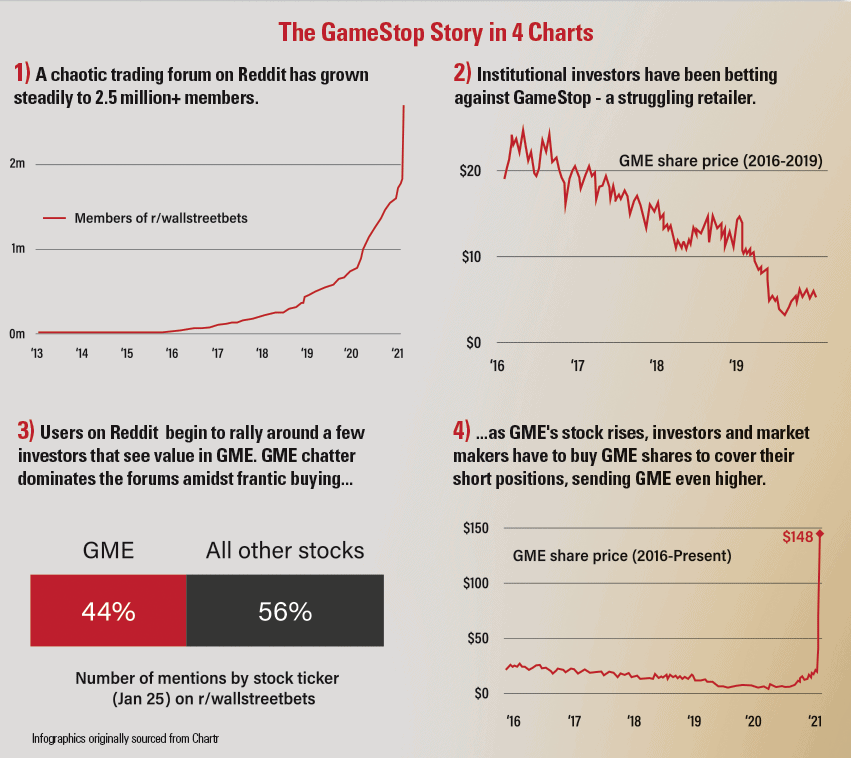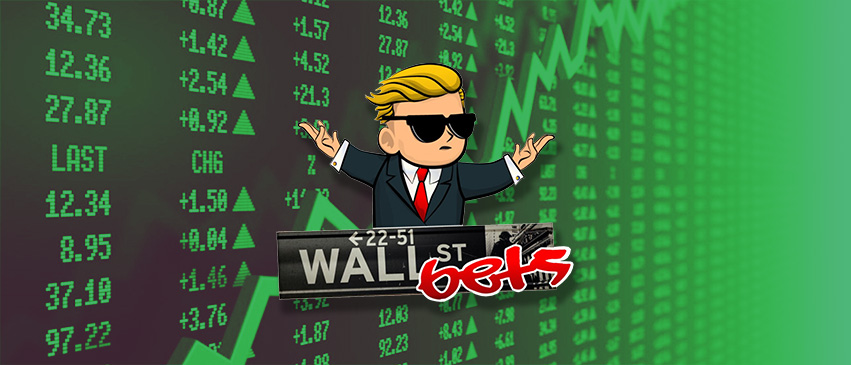The end of January was one of the craziest weeks in stock market history, but you wouldn’t have known it by looking at broad index performance. Most people assumed that GameStop—the video game retailer with locations around the world, including Peoria—was hanging on by a thread. Yet its stock captivated the hearts and minds of Americans on both Wall Street and Main Street as few others have ever done before.
GameStop has struggled mightily in recent years, as gaming has undergone a massive shift from physical cartridges and discs to digital downloads and mobile gaming. Concurrent with this shift has been a decline in the need for gamers to visit stores to buy, sell or trade games. While the fundamentals of the business haven’t really changed, the share price sure has. It was up more than 300 percent the last week of January, and over 2,000 percent over the last three months.
If you’re wondering what caused this seemingly challenged company to become the belle of the ball in the stock market—and go from trading at under $3 per share less than a year ago, to as high as $347 per share (not a typo) in January—don’t worry! You’re not alone. The short answer is that it was a “short squeeze,” defined as a rapid increase in the price of a stock owing primarily to technical factors in the market rather than underlying fundamentals—nothing new to see here. But there’s more to the story than that.
An Unprecedented Fervor
Most short squeezes throughout history have been some version of Wall Street on Wall Street crime—pros squeezing other pros. What makes this instance unique is that it was largely driven by a cadre of retail traders using the self-organizing power of social media to coalesce around GameStop (and other once beaten-down names) and engage in a tug-of war with hedge funds and the “Wall Street elite.” The infographic below summarizes things nicely.

These traders have largely orchestrated their efforts on the social messaging/discussion platform Reddit (and its now infamous subforum WallStreetBets) and leveraged commission-free apps like Robinhood to implement their trades.
Just when we thought the week couldn’t get any crazier, Thursday came along and the massive volatility and price movements caused some brokers—ironically, including Robinhood—to suspend purchases of a handful of these names. This caused a widespread backlash, infuriating many of Robinhood’s core users who previously saw the app as the great democratizer of investing and which was now, from their perspective, siding with the old guard they sought to upend.
Despite the media romanticizing this effort as a bunch of small-dollar traders sitting in mom and dad’s basement, there are clearly other players influencing these moves. Reddit users and Robinhood traders may have been the catalyst for this trend and have dominated the headlines, but it would be silly not to recognize that professional traders with large wallets are also fanning the flames—and riding the wave with them.
All this speculative fervor has some worried about the potential downside if the volatility spreads elsewhere. We have already seen some forced selling by hedge funds that needed to de-risk and cover their short bets. While there are some mild concerns that a large-scale unwinding of over-leveraged positions could create a bit of contagion across the hedge fund universe, fears of a broader market spillover are a bit overblown.
Eyes on the Prize
As alluring and eye-popping as the recent returns have been for GameStop, we can’t forget that markets can be unforgiving to the downside as well. It’s not just the hedge funds of the world that will be hurting, but novice investors who may not know any better and got in at the wrong time. As much as this “retail army” of Robinhood and Reddit traders seems to be coordinated and aligned in their mission to drive these stocks higher and higher, trees ultimately don’t grow to the sky; it’s every man and woman for themselves when some of these newly-minted paper millionaires seek to lock in their paper gains. Every party eventually comes to an end, and someone will be left holding the bag.
This is not the first mania we have witnessed, and it won’t be the last. While some fortunes have been made through speculation, multiples more have been destroyed. Investors will need to decide if they want to get caught up in the madness—and the corresponding risk it entails—or if they are comfortable sitting this one out and keeping their eyes on the long-term prize that a more disciplined and evidence-based approach can provide.
What makes investing so fascinating is that unlike many other competitive pursuits, the pros and amateurs are on the field at the same time. And sometimes the amateurs actually win! The temptation to act during these fleeting periods of market euphoria is strong. Yet as powerful as FOMO can be, the great thing about any game is that you don’t have to play. You can always choose to spectate from the sidelines, instead of speculating on the field. PM
Philip R. Huber, CFP, CFA, is chief investment officer for Savant Wealth Management. Daryl R. Dagit, CFP, CRPS, CEP, is a financial advisor and market manager in Savant’s Peoria office. This is intended for informational purposes only and should not be construed as personalized financial advice. Please consult your financial professional regarding your unique circumstances




